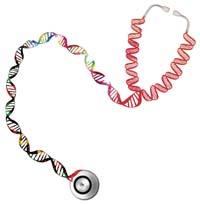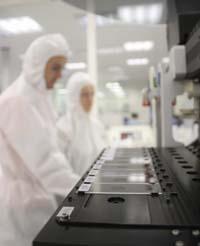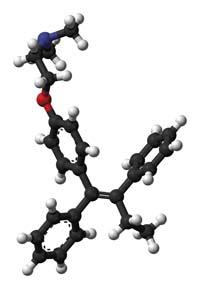Genetics at the service of medicine

Progenika, one of the companies of the Zamudio Technology Park, works in the field of personalized medicine and its scientific director, Diego Tejedor, explains what this new branch of medicine consists of. In the words of Tejedor, "we do not seek treatment for each patient, but, within a certain disease, we distinguish the group to which the patient belongs in order to be able to give the best treatment according to their genetic characteristics."
According to the genotype, there are people who, for example, are more likely to develop cancer after treatment than others. Or the medication itself may be beneficial for some people, but it is not effective for others. Thus, the initial separation of these patients involves preventive invention, better treatments and avoid side effects. Tejedor recalls that all this reduces the costs of health services.
An example is the case of tamoxifen used to treat breast cancer. According to Tejedor, 70% of breast cancers are considered positive estrogens, being the main key to their treatment the obstruction of estrogen activity. To do this, one of the most appropriate drugs is tamoxifen, which is associated with estrogen receptors that contain cancer cells, thus preventing estrogen from attaching to them and favoring cell proliferation.
However, some patients (about 30% of all breast cancers) are tamoxifen resistant, according to the enzyme that transforms tamoxifen into enoxifen. In patients with a certain variant of this enzyme this transformation does not occur, with enoxifen being the effective form of tamoxifen, which prevents the reproduction of cancer. Therefore, patients who have this genotype of the particular enzyme do not benefit from tamoxifen.
Well, a diagnostic test developed by Progénica, called B-PHARMAchip, reveals the genotype of this enzyme. Thus, from a simple sample of blood or saliva, the doctor can know from the beginning whether tamoxifen is right for the patient or whether he or she can receive another treatment better. In addition, a single chip serves to predict response to chemotherapy, as it identifies another associated genetic feature.

Within reach of everyone
According to Tejedor, Progenika's goal is to create diagnostic tools that are useful in the most common diseases and that serve the largest number of people. In this sense, Progenika has developed a diagnostic test of familial hypercholesterolemia, LIPOchip.
"We all know people with excess blood cholesterol. Not all of these people have the same genetic characteristics, and some are more at risk for serious cardiovascular problems than others," explains Tejedor. And he explains why: "Some of them have a mutation in the gene that encodes the receptor that extracts lipoproteins from the blood circulation. As a result, cholesterol accumulates in blood vessels, which causes atherosclerosis and cardiovascular diseases, even when young. Detecting this mutation is critical to prevention."
To do this, the LIPOchip test is a test that allows identifying these people and differentiating them from those with high cholesterol due to other factors (inadequate diet, little physical exercise, smoking...). "Normally the latter tend to have enough to recover healthy lifestyle habits to reduce cholesterol. On the contrary, people with familial hypercholesterolemia require specific treatment for which early diagnosis is very important."
However, when choosing the objectives, Progenika does not take into account that they are useful only for diseases that affect a large number of people; Tejedor has specified that treatment is also necessary for this disease: "It does not seem ethical to us to work on the diagnosis of an untreated disease."

Set an example: "For example, today, unfortunately, there is still no effective treatment to cure Alzheimer's, so for us it does not make much sense to design a test that says who has a high risk of Alzheimer's, since the person who knew it could not benefit from this diagnosis. However, if treatments are aimed at family hypercholesterolemia, colon or breast cancer, our tools are useful to the doctor to know what treatment suits each patient and to predict the evolution of the disease."
From clinical needs
Moreover, when designing new products, it is based on clinical needs. "LIPOchip was our first diagnostic test and, in this case, the Spanish patient federation and a medical team proposed a diagnostic tool for family hypercholesterolemia. And the same thing happens in the field of pharmacogenetics, clinicians tell us their needs and we try to offer a solution", explained Tejedor.
In this sense, he spoke very positively about the tool developed to identify blood groups and increase the safety of blood transfusions, the BLOODchip. For the distribution of this chip, Progenika has reached agreements with Grifols, one of the most powerful companies in the health sector internationally, and with Novartis in the United States. For Tejedor, the achievement of these agreements reflects his interest in health services. Grifols himself has estimated that the sale of BLOODchips in the next 5 years will reach 50-100 million euros.
The starting point was also a clinical need: "European leaders working on blood group genetics met with us to develop this product. And as we always do, then we keep in touch throughout the process. Somehow, clinicians are our collaborators throughout the project and eventually become customers."
DNA and antibodies

Although they have different applications, the chips that Progenika has developed are basically the same. They are all DNA chips. "We could also use the RNA," explains Tejedor, "but the RNA has great variability depending on when the sample is taken. That's why we always use DNA and with it we do all the tests."
Therefore, on a piece of glass the synthetic DNA is placed on which the patient's DNA is placed. "Previously, we must amplify certain DNA sequences of the patient, that is, copies of parts of interest for the diagnosis that are attached or not to the synthetic DNA found on the glass." Where and how DNA is associated, it is possible to know the genetic variety presented by the patient.
Proteomika, part of the Progenika group, works with proteins and antibodies. "In our society, autoimmune diseases are increasing considerably, such as rheumatoid arthritis, lupus erythematosus... In them, the immune system of patients acts against their own body, being responsible modulators that activate the system. One of them, very important, is a molecule called TNF. This factor activates our cells to launch the immune system response. Therefore, many of the treatments to deal with this type of disease are aimed at blocking this molecule. Antibodies are used for this," explains Tejedor.
However, these antibodies cause problems, because sometimes the body considers them rice. It then produces an immune response against them that ceases to be effective. In addition, Tejedor believes that the problem is also economic, since these antibodies are very expensive medicines because they are complex to produce and have to overcome strict regulations. These medicines are supplied by the health care system, but some patients may not be effective and the doctor does not notice them until 6-8 months have elapsed since the start of treatment. Also, instead of improving, the patient gets worse.
To solve this situation, Proteomika has developed a kit that allows identifying and measuring the concentration of antibodies administered as drugs in the patient's blood circulation and checking if the patient's body has launched an immune response to this drug, that is, if it has an antibody against the drug.

Under the name of Promonitor you can know the effect of treatment on the patient. If the doctor observes that the level of antibody given as a drug has decreased in the blood or that the patient is producing antibodies to the drug, he or she may replace antibody-based treatment with another.
Weaver wants to make it clear that many of the products they develop are used and paid for by public health services. For example, LIPOchip is free for the patient in 15 of the 17 Spanish communities and is subsidized in countries such as Italy, England, Germany or the United States. The BLOODchip is also paid by blood banks as a complement to the tests they perform. And Promonitor, on the other hand, is very interesting for hospital laboratories, since the antibody against the TNF molecule is a very expensive drug, so in addition to offering better service to the patient, it saves money.
Progenika is one of the great teams of personalized medicine, but not the only one. And in the future they will be even more, because the sector is growing. However, Genoma España and the Fundación Prospectiva Industrial y Tecnológica OPTE have conducted a study on the state of personalized medicine, warning of the existence of several shortcomings in technology, network of health services, knowledge of clinical staff and ethical and legal aspects. Personalized medicine will advance as they become stronger.





